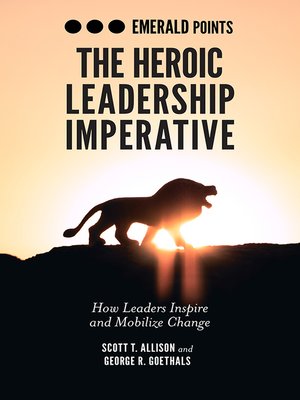The Heroic Leadership Imperative
ebook ∣ How Leaders Inspire and Mobilize Change · Emerald Points
By Scott T. Allison

Sign up to save your library
With an OverDrive account, you can save your favorite libraries for at-a-glance information about availability. Find out more about OverDrive accounts.
Find this title in Libby, the library reading app by OverDrive.



Search for a digital library with this title
Title found at these libraries:
| Library Name | Distance |
|---|---|
| Loading... |
Leaders are expected to be heroic. That is, they are expected to serve three needs of their followers: (1) basic individual needs; (2) group and collective identity needs; and (3) transcendent needs.
The Heroic Leadership Imperative illustrates how leaders who fulfill these expectations succeed attracting followers and initiating social change. Here Scott T. Allison and George R. Goethals identify leaders who have succeeded in meeting all three categories of needs—individuals such as Winston Churchill, Abraham Lincoln, Donald Trump, as well as cult leaders such as Jim Jones—and they discuss such leaders' appeal by way of a unique integration of classic and contemporary psychology relevant to understanding all facets of heroism and heroic leadership. In so doing, the authors explore how heroes and villains have used this leadership imperative to fulfill their ambitions, and provide valuable insights into how societies can avoid falling under the spell of charismatic leaders who misuse the leadership imperative.
For its broad historical coverage, interdisciplinary approach, and relevance to current events, this book is a must-read for scholars and students of leadership studies, and it is of interest to anyone concerned with the political and social upheavals of the past five years.
The Heroic Leadership Imperative illustrates how leaders who fulfill these expectations succeed attracting followers and initiating social change. Here Scott T. Allison and George R. Goethals identify leaders who have succeeded in meeting all three categories of needs—individuals such as Winston Churchill, Abraham Lincoln, Donald Trump, as well as cult leaders such as Jim Jones—and they discuss such leaders' appeal by way of a unique integration of classic and contemporary psychology relevant to understanding all facets of heroism and heroic leadership. In so doing, the authors explore how heroes and villains have used this leadership imperative to fulfill their ambitions, and provide valuable insights into how societies can avoid falling under the spell of charismatic leaders who misuse the leadership imperative.
For its broad historical coverage, interdisciplinary approach, and relevance to current events, this book is a must-read for scholars and students of leadership studies, and it is of interest to anyone concerned with the political and social upheavals of the past five years.







